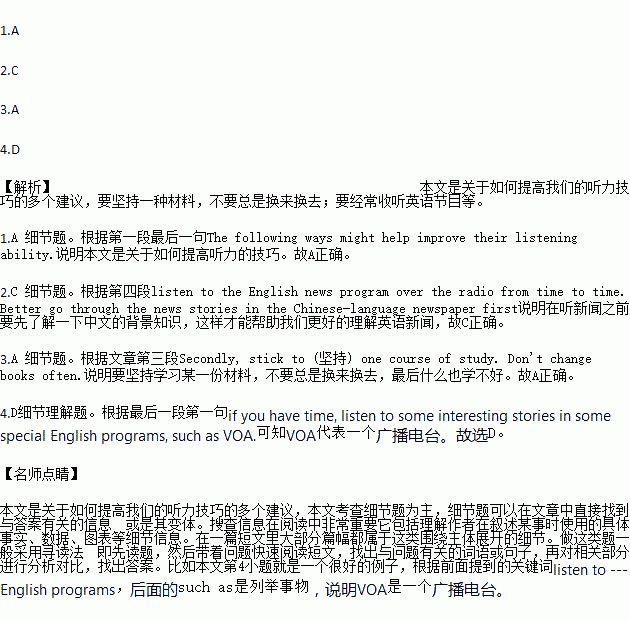题目内容
Learners of English, especially self-taught learners may have trouble in understanding speeches by native speakers. The following ways might help improve their listening ability.
First of all, do things step by step. It is not good to listen to something beyond your level. Better choose a suitable course and start with the first book. Go on to the second book only after you are sure you understand the first one.
Secondly, stick to one course of study. Don’t change books often. Never let your attention be attracted by another course just because it seems to be more “fashionable”.
Thirdly, listen to the English news program over the radio from time to time. Better go through the news stories in the Chinese-language newspaper first. That will make it easy for you to understand the English news on the radio.
Fourthly, if you have time, listen to some interesting stories in some special English programs, such as VOA. or other listening materials of the same level as that of your textbook.
1.This is a piece of advice to learners of English on how to______.
A. improve their listening ability B. read fast
C. write better English and read faster D. speak correctly
2.If you want to understand the English news program on the radio, you should________.
A. read the Chinese language newspaper step by step
B. read again and again the Chinese language newspaper
C. go through the Chinese language newspaper first
D. be able to recite the Chinese language newspaper
3.The author advised that once you have taken up a course, you _______.
A. should stick to it.
B. should begin with the last book
C. should take up other courses if they are more fashionable
D. shouldn’t do anything else
4.In this passage, VOA stands for_______.
A. a book B. a magazine C. a text-book D. a radio station
 小学课时特训系列答案
小学课时特训系列答案

 ur community’s new fountain(喷泉). My oldest daughter, Anne, was very____ and eagerly explored the attractions. There I was happy to see Lily, who was of Anne’s age. They didn’t know each other well, ____ they had met before. I was ____ that Anne would have someone to enjoy the ____with. However, my daughter was about to ____ an important lesson.
ur community’s new fountain(喷泉). My oldest daughter, Anne, was very____ and eagerly explored the attractions. There I was happy to see Lily, who was of Anne’s age. They didn’t know each other well, ____ they had met before. I was ____ that Anne would have someone to enjoy the ____with. However, my daughter was about to ____ an important lesson.